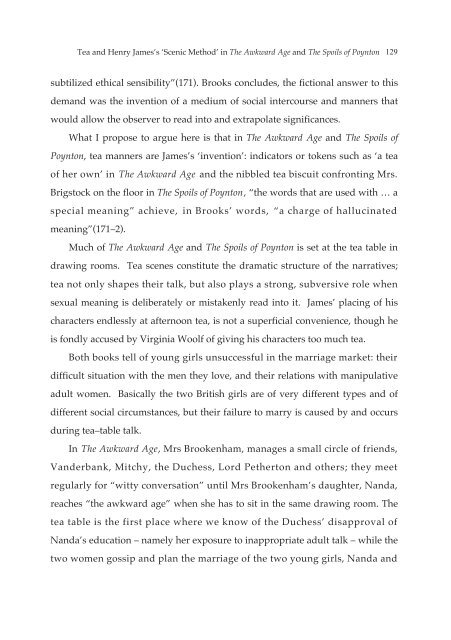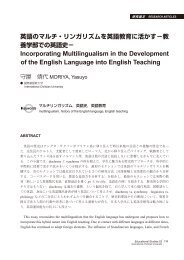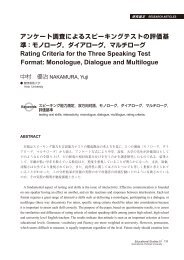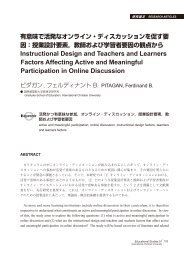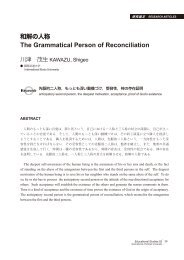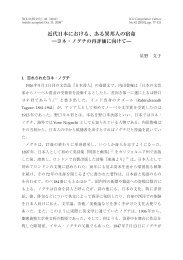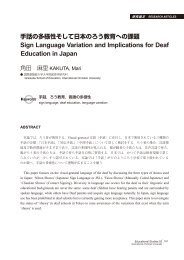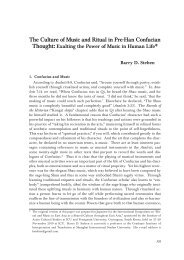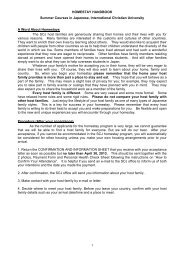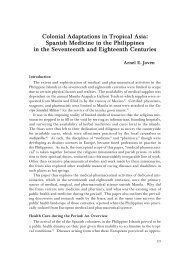Tea and Henry James's 'Scenic Method' in The Awkward ... - subsite
Tea and Henry James's 'Scenic Method' in The Awkward ... - subsite
Tea and Henry James's 'Scenic Method' in The Awkward ... - subsite
You also want an ePaper? Increase the reach of your titles
YUMPU automatically turns print PDFs into web optimized ePapers that Google loves.
<strong>Tea</strong> <strong>and</strong> <strong>Henry</strong> James’s ‘Scenic Method’ <strong>in</strong> <strong>The</strong> <strong>Awkward</strong> Age <strong>and</strong> <strong>The</strong> Spoils of Poynton<br />
129<br />
subtilized ethical sensibility”(171). Brooks concludes, the fictional answer to this<br />
dem<strong>and</strong> was the <strong>in</strong>vention of a medium of social <strong>in</strong>tercourse <strong>and</strong> manners that<br />
would allow the observer to read <strong>in</strong>to <strong>and</strong> extrapolate significances.<br />
What I propose to argue here is that <strong>in</strong> <strong>The</strong> <strong>Awkward</strong> Age <strong>and</strong> <strong>The</strong> Spoils of<br />
Poynton, tea manners are James’s ‘<strong>in</strong>vention’: <strong>in</strong>dicators or tokens such as ‘a tea<br />
of her own’ <strong>in</strong> <strong>The</strong> <strong>Awkward</strong> Age <strong>and</strong> the nibbled tea biscuit confront<strong>in</strong>g Mrs.<br />
Brigstock on the floor <strong>in</strong> <strong>The</strong> Spoils of Poynton, “the words that are used with … a<br />
special mean<strong>in</strong>g” achieve, <strong>in</strong> Brooks’ words, “a charge of halluc<strong>in</strong>ated<br />
mean<strong>in</strong>g”(171–2).<br />
Much of <strong>The</strong> <strong>Awkward</strong> Age <strong>and</strong> <strong>The</strong> Spoils of Poynton is set at the tea table <strong>in</strong><br />
draw<strong>in</strong>g rooms. <strong>Tea</strong> scenes constitute the dramatic structure of the narratives;<br />
tea not only shapes their talk, but also plays a strong, subversive role when<br />
sexual mean<strong>in</strong>g is deliberately or mistakenly read <strong>in</strong>to it. James’ plac<strong>in</strong>g of his<br />
characters endlessly at afternoon tea, is not a superficial convenience, though he<br />
is fondly accused by Virg<strong>in</strong>ia Woolf of giv<strong>in</strong>g his characters too much tea.<br />
Both books tell of young girls unsuccessful <strong>in</strong> the marriage market: their<br />
difficult situation with the men they love, <strong>and</strong> their relations with manipulative<br />
adult women. Basically the two British girls are of very different types <strong>and</strong> of<br />
different social circumstances, but their failure to marry is caused by <strong>and</strong> occurs<br />
dur<strong>in</strong>g tea–table talk.<br />
In <strong>The</strong> <strong>Awkward</strong> Age, Mrs Brookenham, manages a small circle of friends,<br />
V<strong>and</strong>erbank, Mitchy, the Duchess, Lord Petherton <strong>and</strong> others; they meet<br />
regularly for “witty conversation” until Mrs Brookenham’s daughter, N<strong>and</strong>a,<br />
reaches “the awkward age” when she has to sit <strong>in</strong> the same draw<strong>in</strong>g room. <strong>The</strong><br />
tea table is the first place where we know of the Duchess’ disapproval of<br />
N<strong>and</strong>a’s education – namely her exposure to <strong>in</strong>appropriate adult talk – while the<br />
two women gossip <strong>and</strong> plan the marriage of the two young girls, N<strong>and</strong>a <strong>and</strong>


